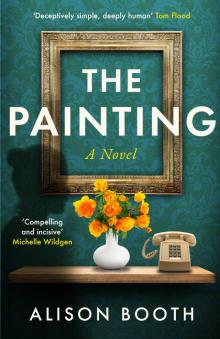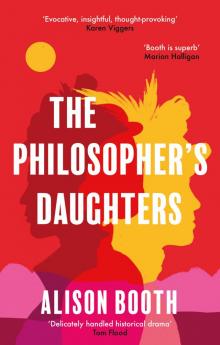- Home
- Alison Booth
The Painting Page 17
The Painting Read online
Page 17
‘Of course it’s a meeting. Everyone’s voice is unique. Think if you were blind, that’s all you’d ever know someone by.’
‘There’s touch too,’ Mama said.
‘Well, I doubt if you’d be touching up Tabilla.’
Mama chose to ignore Anika’s little joke. ‘If I were to meet Tabilla, I would hug her.’ Her voice was dreamy. ‘She is a generous woman who has taken in my daughter and she’s my sister-in-law too. Even if I were blind, if I hugged her I would feel her warmth and get an idea of her height and whether or not she has square shoulders and learn what soap and face cream she uses. And that would be far better than viewing a photograph.’
She cut the strudel in half and pushed it towards Anika. They ate in silence until there were only a few crumbs scattered across the plate.
‘When you left,’ Mama said, ‘I thought I would never see you again. You see, I hadn’t imagined that Hungary would ever be free. All that was left to us was letter-writing and endless days of waiting for your replies. That wasn’t because you wrote infrequently, it was because they checked our mail.’
For the first time in a long while Anika looked at her mother, really looked at her. The frumpy clothes meant nothing and neither did the ill-applied make-up. Immutable as a statue, she radiated kindness and love. Anika’s heart went out to her, the fulcrum of their family’s life. Leaning across the table, she squeezed her hand and told her how wonderful it was to see her again.
* * *
Anika’s parents’ apartment seemed shabbier than she’d remembered. Her bedroom was crowded with furniture that she kept tripping over when unpacking. She couldn’t unpack her anxiety though, it was wedged too tightly in her head. They were a family of worriers. Anxiety was like a trait picked up on leaving the family home, along with a passport and a suitcase. Anika had hoped she’d abandoned it when she’d first left Budapest, but this useless piece of baggage was with her still – a family failing or the burden of history, she had never worked out which.
While Mama was in the kitchen preparing dinner, Anika sat with her father in the living room. She felt dissociated, as if she’d been flung back into another era. Some things remained the same – the predictability of her parents and their unconditional love – but others had changed. The apartment no longer felt like home and her father looked older and seemed somehow more fretful, or perhaps it was simply that she was observing everything now with greater detachment. There were streaks of white in her father’s hair. His face was lined and his forehead permanently creased from a lifetime of raising his eyebrows. It was as if he were permanently surprised by all the changes he’d witnessed to this country of theirs, that had lurched – in less than one century – from being part of an empire to communism to fascism and back to communism, though to a more relaxed sort – that gulyás communism that everyone talked about.
‘I’ve got something to tell you.’ Anika spoke quickly, wanting to get it out into the open.
An apprehensive expression appeared fleetingly on her father’s face, like a cloud blown by a strong wind, soon to be replaced by a bright blankness. He said nothing but his face had already told it all, his concern about her, his concern about everything.
‘It’s about that painting you gave me to return to Tabilla.’
‘Tomas’s painting.’
‘I tried to give it to her but she insisted I keep it. I didn’t want to tell you before, not when I was away, because of the phone-tapping and that other business.’ Anika’s trouble with the police over the Danube Bend project – her arrest and interrogation – was always referred to in her family as ‘that other business’. Their shorthand in case anyone was listening.
He looked surprised. ‘That was good of her.’
‘Yes, she’s very generous. But unfortunately it’s gone now.’
‘Gone?’
‘Yes, it was stolen from my bedroom wall where it was hanging. Don’t look so concerned, we weren’t home when it was taken.’
She censored her account so she didn’t worry him further. It was not necessary for him to learn that the theft took place with Tabilla in the house watching the television.
‘Was anything else taken?’
‘No, nothing. I kept hoping the picture would turn up again but it hasn’t.’
‘Never mind. It wasn’t worth much. We just wanted Tabilla to have something that was Tomas’s.’
‘But it was worth something, you see. It turns out it was by a famous artist.’ Anika explained what had happened, that whole chain of events from when she first took the picture to the Art Gallery of New South Wales. She didn’t mention that it was looted art though. She wanted to talk to Nyenye about that first.
He was silent for a while, his face pensive. After some moments he stood and began to pace around the room, as if marshalling his thoughts.
‘Your grandmother will give you another,’ he said at last. ‘Though not yet. No one is to know about her collection yet.’
‘Why not?’
‘She’ll tell you some day.’
‘I don’t want another painting.’ And she certainly didn’t want one from that collection. You’ve got to keep distinct Tomas’s painting and the collection, she reminded herself. All she wanted at this stage was to discover how Tomas came by the picture. Whether she liked it or not, she was caught up in its provenance – or lack of provenance. She fixed her father with a stern eye and said, ‘Where did Tomas get his painting from?’
‘I don’t really know.’ Her father shrugged and his tone was vague. ‘He had it for as long as I knew him. Someone gave it to him, that’s what your grandmother always said.’
‘It doesn’t bother you that it’s gone?’
‘To be honest, I didn’t like it all that much. And after Tomas died I didn’t really think of it as his painting, I thought of it as Tabilla’s. Anyway, it might turn up again.’
‘Unlikely,’ Anika said. ‘Not if it’s worth that much.’
His face became grim. ‘Your grandparents had no idea that the painting was valuable either. It’s because they hadn’t bought it, I suppose. Not like the other ones in Nyenye’s flat. They had to pay for those.’
Anika filed this comment away to think about later. Right now she wanted to check on something that had been niggling away at her ever since Tabilla mentioned it all those months ago. ‘Have you heard of someone called Sebestyén Tinódi?’
‘The name sounds familiar. Didn’t Nyenye mention him the day you left? I think he was one of Nyenye’s friends. And your grandfather’s too.’
‘How old would he be?’
‘Nyenye’s age, I imagine, although I never actually met him.’
There was a pause while Anika thought about the implications of her father’s words. He and Tabilla had different stories and she didn’t know who to believe. The only way to settle this was to check with Nyenye. But after all that had happened over the past months – the rearrangement of her loyalties, the worries about looted artwork – she didn’t know if she would be able to believe her grandmother. Perhaps the best approach was to tell her that Sebestyén Tinódi was dead and see how she reacted. Anika said to her father, ‘How could my grandparents have afforded to buy all those paintings?’
Her father shrugged. ‘They worked hard. They were always in the shop. Savings weren’t allowed and I think you know how to put two and two together.’ He took a sip of his beer and stared at the heater.
Anika knew then that, if the paintings were legitimate purchases, they must have been bought outside the system. Under communism, only the consignment store and the state auction house could buy and sell paintings, but there was sure to have been a black market for pictures, there were black markets for just about everything. Of course, Nyenye’s paintings might not have been purchased at all – they could have been looted, looted by the Naz
is when they took over Budapest in the Second World War. Or looted by Hungarians when the Jews were sent off to concentration camps. Yet if that was the case, why had her father said that her grandparents had to pay for them?
She was back to the same old questions that had been plaguing her for months. Were her grandparents hard-working people who might have taken a few risks operating outside the system when their business became more successful than they’d anticipated? That’s what she’d once believed. But ever since that afternoon with Daniel when they’d walked to Clifton Gardens her thoughts had been shifting. Perhaps her grandparents were calculating entrepreneurs providing a safe depository for looted art. And patiently waiting for the collapse of the communist regime before slowly releasing artworks on to the international art market. Maybe they were not as smart as she’d thought. Maybe they were criminals.
Her father said, ‘The pictures Nyenye has in her collection now are certainly much loved.’
There was something in the way he said this, the emphasis he put on the word now, that unsettled her. She said, ‘Did Nyenye not like the Rocheteau?’
‘She was glad to see you take it away.’
‘Why?’
‘She never liked it much.’
This puzzled Anika, for she knew Nyenye had a good eye for artworks and that – unlike Tabilla – she didn’t care for more modern paintings. Maybe she had thought of Tabilla as having ownership rights to the Rocheteau, just as Anika’s father had. Anika decided to change her approach. ‘What was Tomas like?’ she asked.
‘He was funny and kind and handsome. Everyone liked him.’ Her father stared into the distance, as if that would help him conjure up the past, and she waited for him to go on. Eventually he said, ‘Don’t mention anything about Tomas’s painting to Nyenye just yet. It might upset her that it’s been stolen. She’s been looking forward so much to seeing you and it would be a shame to spoil her happiness.’
‘I can’t wait to see her.’
Anika didn’t want to spoil her happiness either but she did want to learn the truth and she’d choose her own time to talk to her grandmother about the painting.
Chapter 25
Anika still found it hard to believe that the old regime had gone and here she was waking at noon in her parents’ apartment. Opening one eye, she saw her mother silhouetted against the light from the hallway; she reached up for a hug like she used to when she was a child.
‘It’s lucky that Nyenye’s coming for dinner not lunch,’ Mama said, smiling. ‘She’ll be here at five. Your father’s at work and I’d hoped to spend some time with my daughter but it looks as if she just wants to sleep all day.’
Anika was in the entrance hall later that afternoon when Nyenye arrived.
‘Dearest girl, how well you look!’ Nyenye said, laughing. ‘And I would swear you’ve grown but I know that can’t be the case, it’s more likely I’ve shrunk. Such a pretty young woman! Mind my strudel, don’t hug me too hard. It’s poppy seed, I hope that’s still your favourite, do let me put it down. Oh, your mother’s taking it, now I can give you a proper hug.’
Anika held her grandmother tight; how thin she seemed, had she always been this slight? Over her shoulder, Anika saw, through eyes blurred with tears, Mama’s expression. She too had made a poppy seed strudel and Anika could guess what she was thinking; if Nyenye would just get the phone installed she could have called to let them know she was planning to bring a dessert.
Kissing Nyenye’s cheeks now, Anika noticed how much more wrinkled she had become. Gravity and age had done their work and her throat and chin had lost their definition but when she smiled Anika forgot all about appearances.
‘This is like a miracle,’ Nyenye said. ‘Do you know, I’d thought I might never see you again?’
‘But here I am. And I’m so happy to be back.’
Soon after, Miklos arrived. He seemed taller than Anika remembered, and stronger. Broad-shouldered and a head taller than her, he was rather handsome too, with that broken nose from football several years ago giving his otherwise symmetrical face some interest. But he was also instantly recognisable as her occasionally irritating big brother who used to tease her about anything and everything. Pulling her hair. Hiding her toys. And, when she was older, ribbing her about boyfriends. They hugged and he lifted her up and twirled her around a few times until, breathless, he had to stop.
‘You are so heavy, Anika,’ he said. ‘Too many fasírozott. Those meatball patties always were your weakness.’
‘You are so feeble, Miklos,’ she replied. ‘You need to eat more pörkölt to build up those puny muscles of yours. Pork stew with dumplings is just what you need.’ They collapsed laughing at this point. Meat was not something they took seriously enough, being the progeny of butchers.
Anika’s mother lit candles and her father opened a bottle of wine, and Miklos pulled out a chair for Nyenye like a waiter in a restaurant. The candlelight flickering over their faces made them look like a painting from a previous century, Anika thought, and she felt grounded for the first time since leaving Budapest years before. But she watched Nyenye closely. Although she appeared the same – a sweet old lady who loved her family – after what Anika had learned in Australia, she was no longer sure of who her grandmother was.
Just one glass of wine went to Nyenye’s head. No sooner had she swigged it down than she embarked on scurrilous anecdotes about her neighbours in the apartment block, many of them her friends for decades, but there were also some informers living there, she reckoned, for everyone knew that the secret police could never have learned about what was going on in people’s lives without a network of spies everywhere. You never knew who might be one, and no one ever talked about what the AVO did to its prisoners. People who’d been released after a spell with the AVO were as silent as if they’d had their tongues cut out.
Suddenly uncomfortable, Anika shifted in her seat. It was just as well those days were in the past, for why would the secret police need informers when a bottle of wine would release such a torrent of information from her grandmother? She glanced at Mama and knew right away what she was thinking, that Nyenye was going on too much.
Yet Anika was maligning Nyenye; the old regime had gone, she was with her family and letting her hair down with the five of them sharing a meal. It was significant that Nyenye spoke about those days in the past tense: could her old suspicion perhaps have gone away? And if she was willing to be so unusually open over dinner, maybe tonight was a good time for Anika to find out more about Tomas and the painting. When Nyenye got up to leave, Anika offered to walk her home.
‘No need,’ Nyenye said. ‘It’s only three blocks.’
‘I feel like a breath of fresh air, Nyenye. It will help me sleep better.’
Her father nodded his approval. When Nyenye turned away to find her bag, he winked at Anika. It was clear that he thought his mother was too tipsy to go home alone.
‘I could go,’ Miklos said, ‘but I have to phone Irma first to let her know I’ve arrived.’ Irma was his new girlfriend, the latest in a series, Mama had told Anika earlier. Miklos was pursued by women for reasons that Anika didn’t quite understand, for though funny and kind he could also be obnoxious and too keen to get his own way. Irma was different, Mama had said. This time it was serious. So serious that he would go back to Szeged a couple of days after New Year’s Eve to be with her.
‘I want the walk,’ Anika told Miklos. ‘You go and phone your girlfriend.’
When he had untangled the phone cord enough to get the receiver into his bedroom with the door shut, Nyenye whispered to her, ‘Miklos has to do the running with this one. Irma knows how to pull his strings and push his buttons and generally keep him to heel.’
Nyenye and Anika walked down the wide spiral staircase that led from the apartment into the old carriageway with its cobbled surface, and out into the st
reet. The evening was icy cold, it was like they’d just stepped into the cool room of the Molnars’ shop. When Anika tripped over the kerb, Nyenye seized hold of her arm. The street was dark, though the sky was light enough to suggest the moon must be visible somewhere, but not from the floor of this canyon with its array of five storey buildings looming up on each side. There were a few people about, couples mostly, arm in arm, hurrying against the cold.
They turned right at the first corner. Diagonally opposite was a bar full of elderly men; inside, the light was poor so you couldn’t make out their faces clearly. They could be in an old black-and-white film from the 1930s, Anika thought, and at any moment a spy would materialise and hand over secret documents.
Rounding the next corner, she could see the gibbous moon, its aureole making it seem larger than it was. Her grandmother might look frail but she was a fast walker and Anika had to hurry to keep up with her. They strode past shabby once-grand apartment blocks, with broken neoclassical features and chipped stucco and pockmarked stonework, and turned into Nyenye’s building. She shut the heavy door behind them and leaned against it for a moment to catch her breath. Ahead was the central courtyard and to the right rose the dimly lit but rather grand staircase with its wrought iron balusters and elegant stone treads. The staircase wound up around a space that might have been big enough to put a lift into, if only someone could find the will and the money.
A middle-aged man with a figure like Humpty Dumpty’s was coming down; he nodded and stopped on the first-floor landing to talk to Anika’s grandmother. She introduced him to Anika as Tibor, who had recently moved into her apartment building. She described Anika not as her granddaughter but as a visitor. Perhaps it was because of this that Anika got the impression that she didn’t trust him, but her reserve might also have been because she didn’t trust many people. Anika shook his hand and mumbled a few words. When he asked where she was from, Nyenye didn’t let her reply, as if she wanted to protect her or to save herself embarrassment. ‘Australia,’ she said firmly. ‘Her Hungarian is excellent, no? But we must get on.’

 The Painting
The Painting The Philosopher's Daughters
The Philosopher's Daughters A Distant Land
A Distant Land A Perfect Marriage
A Perfect Marriage Stillwater Creek
Stillwater Creek The Indigo Sky
The Indigo Sky